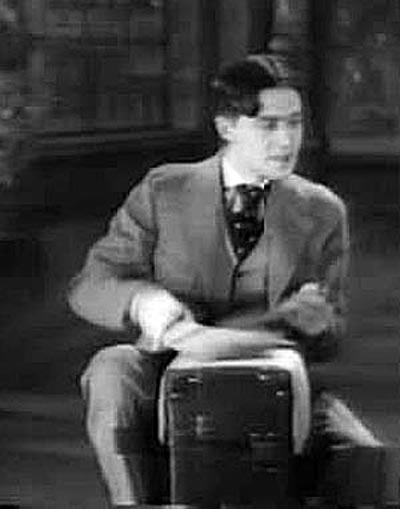
[Some computers might ask you to allow the music to play on this page]
Josh Billings (suitcase) |

Josh Billings was 'a character'. Until recently, there has been little information about him online - or in reference books for that matter, but in the 1920s and 1930s he was there with the Chicago and New York jazz musicians we know so well. That is possibly because he has not been seen as a bona fide musician, but there is more to Josh than meets the eye.
Until 2020 information about Frank 'Josh' Billings was sketchy and at times a little misleading, but last year Gerry Paton in America started to draw together information about Josh that was scattered among various publications - click here for Gerry's article - Frank Josh Billings, A Suitable Case For Treatment. It is an interesting read but there are a few things that we are able to add here.
Sandy Brown Jazz reader Colin Brown has checked the 1910 United States Census for us and notes that Frank R. 'Josh' Billings was born in Chicago on 14th February 1905. His parents were Thomas E Billings and Rebecca R Billings. Thomas was not a doctor as stated in some articles, but rather a printer. This would tie in with Frank later becoming a lithographer. His mother was a Physician. Her maiden name was Rhoads, which was Frank's middle name. In the 1920 US census, Thomas Billings has disappeared and Rebecca has remarried to Charles McIntyre, a doctor. Charles already has a son, aged 36, who is a chemist. (This would account for some articles claiming that Josh's parents were both doctors). They were living in Walnut Street in Chicago. Curiously, Frank’s date of birth is given here as 1906, suggesting a degree of flexibility in the recording procedures. In the 1930 census, Frank has now morphed into Frank B McIntyre, and is now described as stepson of Charles. His occupation is given as Musician in the broadcasting industry, but he is at the time unemployed. He is still living in Chicago at Homan Boulevard. The change of name in the official records underlines the difficulty in tracing him. A review of the New York records of deaths for 1957 is confusing. This may well be due to the fact that Frank was variously known as Frank Billings, Frank Dillings, Joe Billings, Josh Billings, Frank B McIntyre. However as far as we can see Josh died on 13th March 1957.
Before we go any further, it might be helpful to introduce Josh who, in this short film from 1929, is playing the suitcase with the Mound City Blue Blowers. The film is from a movie short, The Opry House.
The Opry House might be confused with a short film of the same title and the same year starring Mickey Mouse, but the one we are talking about is described by moviemagg: 'The manager of a rural vaudeville theatre (Lew Hearn) announces that his name act from out-of-town won’t be able to perform, so in 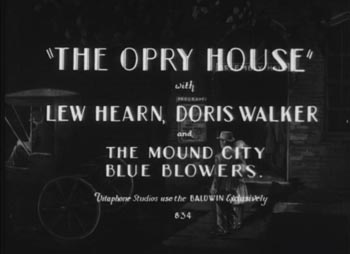 their stead he’s going to put on local talent. “It’s the policy of this here opry house not to make refunds,” he says, “so sit back and enjoy the show the best you can.” What follows is mostly a performance by the pioneering jazz novelty act the Mound City Blue Blowers — Red McKenzie, vocals and a variety of kazoos (including one made out of a tin can); Jack Bland, banjo (incidentally he plays a solo by tapping on the strings along the fretboard — 60 years later Stanley Jordan would be considered a major innovator when he did that); Carl Kress, guitar (not Eddie Lang, who usually played with the band but was also a much in-demand session musician and might have had another, better-paying gig that afternoon; Lang died in 1933 but did get to be in a film, The Big Broadcast, as Bing Crosby’s accompanist); and Frank “Josh” Billings, playing an upturned suitcase with whiskbrooms in lieu of a drum set.....
their stead he’s going to put on local talent. “It’s the policy of this here opry house not to make refunds,” he says, “so sit back and enjoy the show the best you can.” What follows is mostly a performance by the pioneering jazz novelty act the Mound City Blue Blowers — Red McKenzie, vocals and a variety of kazoos (including one made out of a tin can); Jack Bland, banjo (incidentally he plays a solo by tapping on the strings along the fretboard — 60 years later Stanley Jordan would be considered a major innovator when he did that); Carl Kress, guitar (not Eddie Lang, who usually played with the band but was also a much in-demand session musician and might have had another, better-paying gig that afternoon; Lang died in 1933 but did get to be in a film, The Big Broadcast, as Bing Crosby’s accompanist); and Frank “Josh” Billings, playing an upturned suitcase with whiskbrooms in lieu of a drum set.....
.....They play hot versions of “I Ain’t Got Nobody” and “Tiger Rag,” with McKenzie proving (as Louis Armstrong was also doing at the time) that if you understood the nature of jazz and could phrase like an instrumentalist, you could record great jazz vocals even if you didn’t have much of a voice per se. The only let down in the film is the middle number, a dull version of “Let Me Call You Sweetheart” by singer Emma Perkins, whose childlike mannerisms and cutesy voice make her seem like Shirley Temple’s older sister.'
The film shows Josh as an uninhibited young man who was able to add energy and fun as well as talent to his performance ..... and the second number is of course My Gal Sal, not Tiger Rag as moviemagg suggests.
As Gerry Paton discovered, a fair bit of information about Josh can be found in guitarist Eddie Condon's biography We Called It Music. We know that as a young man Josh hung out in Chicago with those musicians who became known as the Austin High School Gang - Jim Lanigan (piano); Jimmy McPartland (cornet); Dick McPartland, (banjo, guitar); Frank Teschmacher (alto sax) and Bud Freeman (C-melody tenor sax). They were of a similar age to Josh and while some articles suggest Josh also went to Austin High, we have been unable to confirm this so far. The Gang moved on to New York City while Josh stayed in Chicago until 1928. Eddie Condon writes how 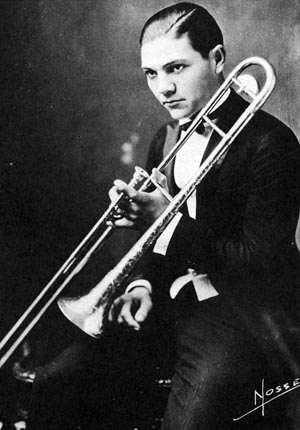 he and some of the Austin High School Gang were staying at The Cumberland Hotel just off Broadway:
he and some of the Austin High School Gang were staying at The Cumberland Hotel just off Broadway:
'(Red) McKenzie came back from St. Louis. MacPartland and Freeman called us long distance from some road-stop to ask how things were going.
"We're ready," I told them. "Come on in."
"Fine," Bud said. "By the way, would you like to hear the greatest trombone player in the world?"
"Put him on," I said. "What's his name?"
"Jack Teagarden," Bud said. "He's from Texas ......."
Jack Teagarden
Duncan Schiedt Collection
But despite Jack Teagraden joining them things did not go well and soon their money was running out. Eddie continues: ''There were five of us now in the two rooms (at The Cumberland); (Mezz) Mezzrow and Josh Billings, a jazz fan, had come in from Chicago. Very quickly we were back on the olive and cherry diet, with canned tomatoes for breakfast .......'. A successful dance act, Barbara Bennett and Charles Sabin, were friends and Barbara helped pay some of the outstanding bills for the musicians at The Cumberland. They finally paid off their debts and Eddie and Mezz Mezzrow picked up work at Valley Stream in Long Island.
'We took room and board with an old lady who boasted of her piety and her cooking,' writes Eddie. 'her pies were so bad we hid our pieces under our coats and threw them into the garbage .......Billings, a natural prowler, discovered a hoard of wine in the cellar and tapped it. The old lady put locks on the cellar doors. Billings, who could open a bank vault with the hairspring of a watch, picked them with a nail file. The old lady bought a police dog. The dog slept with Billings. Finally we tired of malnutrition and moved to the home of a Jewish lady........'
Gerry Paton's article shares more of the story, but it becomes clear to me that Josh is playing a substantial part in keeping up the morale of the musicians as they struggle to make ends meet. Josh was still with them in 1929. 'The Panic was on for us in early 1929.' writes Eddie Condon. 'You could make a million dollars in anything but jazz that spring. We ate from hand to mouth and it was somebody else's hand.'
A gig came up at a Country Club; during the day the band had been to party and then realised they were supposed to be playing at the Club. Dischevelled and a bit the worse for wear they made it only to find members of the audience wanted different things, some jazz, some Strauss waltzes.
'Finally we decided to turn our backs on the audience and enjoy ourselves,' says Eddie. '....... Now and then I took a quick look at the dancers; they were shocked, disgusted, irritated, bored and mad. McKenzie and Billings were with us, sitting on the stand. We began playing the blues, BIllings picked up a megaphone and sang, improvising as he went along. It was a final insult to the audience:
I came to this party thinkin' I would have a good time,
I came to this party thinkin' I would have a good time ,
I'd sell it for a nickel and a high price would be a dime.
......................................
We finished and went back to New York by train........'
When Eddie went to collect their money from the agent, he refused to pay. "Your appearance was an insult - and while we're on the subject, who were the two Chicago gangsters you brought with you?" He was referring to Red McKenzie and Josh Billings. Red McKenzie went and sorted the matter out.
Listen to Josh with the Mound City Blue Blowers playing Tailspin Blues in 1929 with Red McKenzie (kazoo) and Jack Teagarden (trombone).
During the summer of 1929, Eddie Condon and some of the others played and toured with Red Nichols and Josh went back to 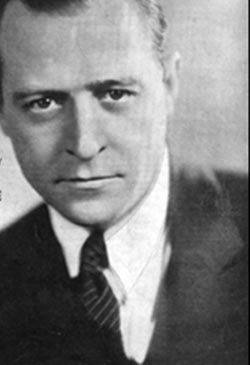 Chicago. In November, Eddie and Red Nichols fell out and Eddie was fired. 'It was November, 1929. The Stock Market had fallen down a rabbit hole ... I was broke.' writes Eddie. I ran into McKenzie ....'
Chicago. In November, Eddie and Red Nichols fell out and Eddie was fired. 'It was November, 1929. The Stock Market had fallen down a rabbit hole ... I was broke.' writes Eddie. I ran into McKenzie ....'
Red McKenzie
Red McKenzie said that Jack Bland was talking about playing at parties and saloons. "Jazz is a luxury. Too bad it's such good music. The poor man likes it but only the rich man can afford it.'
"I thought you said you wouldn't play at parties. Aren't they too undignified?"
"Mind your own business. Bland will play the guitar; you'll louse up the banjo; Billings will play the suitcase."
'Billings had finally contrived a place for himself in music. In Chicago in a hotel room during a jam session involving a comb and a banjo he had rigged a suitcase to act as a drum. For soft effects he covered the case with wrapping paper, which he wrinkled and then stroked with whisk brooms. For bass effects he kicked the suitcase with his heel. McKenzie, dubious but intrigued, let him try the trick with the Blowers on a party job. It was a success; Billings was a Blue Blower.'
'At parties everyone wanted to play the suitcase, and sooner or later everyone did, even Mrs Vanderbilt .....'
'...... Billings had a trick of flipping a tip - usually a five-dollar bill - off the suitcase and catching it under his armpit, so that it seemed to disappear. He kicked suitcases to pieces pretty fast. I went with him to the luggage shops to watch the proprietors when Billings tried out their wares.
"I'd like a suitcase," Billings would say. "I prefer one made of fibre."
The man would bring several. "This is our best" he would say, pointing to a particular one.
"A very nice bag," Billings would say. Then he would kick it. The proprietors never said anything - this was during the depression - but as Billings tapped, slapped, and kicked the bags, listening and muttering to himself, I had the pleasure of observing the effect on a man's face of the gradual discovery that he was dealing with a dangerous lunatic.
"He's harmless," I whispered to one luggage man who seemed really frightened. "He just likes to kick suitcases." The luggage man was willing to be sympathetic. "Maybe his wife ran away with a salesman," he suggested.' .....
.......'Rome had a fiddler while it was burning. New York in 1929 had the Mound City Blue Blowers..........Nobody thought the Stock Market crash was serious, or that the panic would last. Only the Blue Blowers were having a hard time, though as usual we drank well. Billings had a phrase for his diary which covered our daily life: panic, parties and pollution.......'
Josh Billings will probably be best remembered as a musician who played the suitcase. As Gerry Paton points out, the suitcase had been played as a percussion instrument for some years before Josh played it. Other musicians in the Mound City Blue Blowers also played improvised instruments - Red McKenzie the comb and paper, Dick Slevin the kazoo.
Let's take a moment then to consider the Mound City Blue Blowers ......
Red McKenzie (comb and paper), Dick Slevin (kazoo) and Jack Bland (banjo) first brought together the Mound City Blue Blowers in 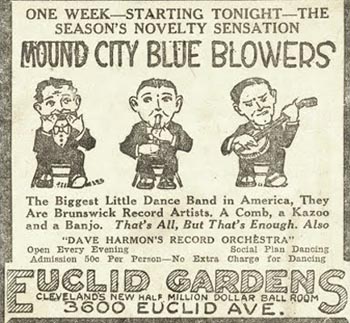 1923. There are several 'Mound Cities' in the United States. Wikipedia suggests that the Blue Blowers were named after Mound City in St Louis, Missouri, so called because it was a center of Native American Mississippian people who built numerous temple and residential earthwork mounds on both sides of the Mississippi River. The site of an ancient Native American city, the mounds are located in Collinsville, Illinois in the southern part of the state, across the Mississippi River from St. Louis. Cahokia Mounds cover 2,200 acres and contain 70 mounds. Red McKenzie was born in St Louis in 1899, the same year that Jack Bland was born in Sedalia, Missouri.
1923. There are several 'Mound Cities' in the United States. Wikipedia suggests that the Blue Blowers were named after Mound City in St Louis, Missouri, so called because it was a center of Native American Mississippian people who built numerous temple and residential earthwork mounds on both sides of the Mississippi River. The site of an ancient Native American city, the mounds are located in Collinsville, Illinois in the southern part of the state, across the Mississippi River from St. Louis. Cahokia Mounds cover 2,200 acres and contain 70 mounds. Red McKenzie was born in St Louis in 1899, the same year that Jack Bland was born in Sedalia, Missouri.
Moviemagg suggests another derivation, arguing that 'St. Louis at that time dumped its trash in giant garbage piles on the outskirts of the city and then covered them with dirt in a vain attempt at making them sanitary; the residents thought they looked like mounds and so “Mound City” became a nickname for St. Louis'.
Over time, the Mound City Blue Blowers would include a number of well known jazz musicians. They recorded twelve tunes in 1924 and 1925 with Frankie Trumbauer and Eddie Lang on some of the tracks. After 1925, McKenzie recorded under his own name as a vocalist, but returned to the Mound City name in 1929 for several sessions with jazz stars including Jack Teagarden, Coleman Hawkins, Glenn Miller and Pee Wee Russell, then in 1931 with Muggsy Spanier and Jimmy Dorsey, and from 1935–1936, with appearances from Nappy Lamare, Spooky Dickenson, Billy Wilson, Bunny Berigan, Yank Lawson, and Eddie Miller.
Here's Josh playing the suitcase with the Mound City Blue Blowers on Girls Like You Were Meant For Boys Like Me in 1930. On this occasion the Blue Blowers included Red McKenzie (vocals, comb); Benny Goodman (clarinet, alto sax); Bud Freeman, Coleman Hawkins (tenor sax); Fats Waller (piano); Eddie Condon (banjo) and Josh Billings (suitcase).
A surprising amount of tonal effects were possible from a suitcase. Looking at the videos of Josh playing the suitcase the technique seems relatively simple, but that is clearly underestimated. In a detailed article by Gerry Paton looking at drum brush-playing in early jazz (click here), Gerry shows that Josh's technique was far from simple and contributed to the evolution of brush playing as drumming techniques evolved.
We are lucky to have another movie short from 1931 with Josh and the Mound City Blue Blowers playing St Louis Blues. The movie is Nine O'Clock Folks, a short film in which 'various acts perform musical numbers before an audience in a theater. One of these acts 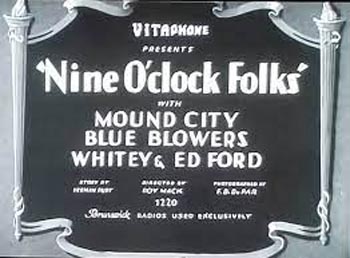 is a tap dancer whose shoes have extensions on them that allow him to balance on the ends as one might use stilts. In the finale, a dog in the audience performs tricks. The title refers to the curfew in the town.'
is a tap dancer whose shoes have extensions on them that allow him to balance on the ends as one might use stilts. In the finale, a dog in the audience performs tricks. The title refers to the curfew in the town.'
One of the reviews on the International Movie Database said: 'Well, well well. What do we have here? A stupid hillbilly short. So we get to see a bunch of hick acts including a dancing man with big shoes (who's okay), a horrific female vocal trio, and an idiotic emcee. Oh. And the dog. Apparently hillbillies can't tell the difference between a drunkard and a dog. (It's a mystery how they ever got that dog into that little suit and hat!). But amidst all the silliness and stupidity, a light shines out in the darkness...The Mound City Blue Blowers! Yes!
Everybody's favorite comb-and-paper soloist, Red McKenzie, is there with his band. Jack Bland and a young Eddie Condon are on strings, and the three of them really heat things up. Unfortunately, the experience is marred by an awful man on whisk brooms and suitcase. Frank "Josh" Billings, with his blacked-out teeth and hillbilly haircut completely undercuts the greatness of the band, and, even more unfortunately, the camera remains on Billings and his suitcase most of the time, and not on the real musicians. If you can get past the idiot hillbillies, then it's a good short. I suggest skipping the rest of the short and watching only the part with the Blue Blowers. And I suggest watching that part with your eyes shut.'
Here are the Mound City Blue Blowers from the movie Nine O'Clock Folks - Red McKenzie (comb and paper / kazoo), Eddie Condon (guitar), Jack Bland (banjo, vega) and Josh Billings (suitcase) and St Louis Blues:
It seems unfortunate that the reviewer wrote off Josh Billings' performance in that way, and as Gerry Paton has proved above, there is far more to Josh's playing than just his larking about. Although at first sight it seems that Josh has blacked out his teeth, the truth is a little different. Eddie Condon again: 'Billings one night decided to be a good Samaritan and drive a drunk's car home to Jamaica. When it was done the grateful drunk said, "I'm all right now. I'll drive you to the bus stop." Billings surrendered the wheel. Before they were out of second gear the car hit an El post and Josh was thrown through the windscreen. He went to the hospital in an ambulance .... Billings arrived home for breakfast; the only parts visible on him were his nostrils and one eye. The owner of the car was an insurance man; Billings collected some money - he wouldn't tell us how much - and went into town. He registered at the Pennsylvania Hotel and gave Harlem hell.'
Josh returned to Chicago and Red McKenzie, Eddie Condon and others played in various parts of the USA. Eddie recalls: 'We returned to New York in the early spiring and opened at Shanley's, a place on West Ninety-sixth Street operated by Hal Hixon..... McKenzie wired Billings in Chicago to come on immediately. Billings walked into Riverside Towers two days later and tried to say hello.'
"My God!" McKenzie said. "He hasn't any teeth!"
'Billings tried to explain himself, but could only mumble and drool. Finally he sat down and wrote us a note: "Trouble with teeth from accident in Jamaica. Had to have them all pulled. New ones not ready when I left. Coming by mail." '
Listen to Josh and the Mound City Blue Blowers playing You Rascal You in 1931. Muggsy Spanier (cornet); Red McKenzie (comb, vocals); Jimmy Dorsey, (alto sax, clarinet); Coleman Hawkins (alto sax); Jack Russin (piano); Jack Bland (guitar); Eddie Condon (banjo); Al Morgan (bass); Josh Billings (drums). It sounds as though someone else joins Red McKenzie on vocals but I am not sure who.
According to the allmusic website, 'Inventive as he was, Billings would soon opt for a more lowkey job as an assistant or "bandboy" for Ray Noble. It was not the end of his career as a drummer, but there was a long gap. Billings worked as a lithographer in Chicago, beginning his drumming again when his friend Eddie Condon opened his own club in New York City dedicated to vintage jazz. At this point Billings played a normal drum set, maybe because he could leave it set up in the club. Josh was one of the co-writers on the pessimistic ditty Never Had a Reason to Believe in You.'
The Mound City Blue Blowers play Never Had A Reason To Believe In You in 1929 with Jack Teagarden on trombone.
Time passed and Josh returned to Chicago. In the winter of 1938 he dropped in on Eddie Condon when the Summa Cum Laude band played in the city, and in 1941 Eddie recalls that he had been asked to assemble a quartet of Chicago jazz players for The Chamber Music Society of Lower Basin Street, a National Broadcasting Company programme: 'Pee Wee (Russell) stayed with Josh Billings and Slim Kurtzmann, who were sharing an apartment. Both Josh and Slim had given up playing the suitcase and Billings was working days as a lithographer ....'.
On 14th March 1957, the New York Times carried a short obituary for Josh Billings:
Josh Billings Is Dead Frank (Josh) Billings, a member of the group of jazz musicians known as the Mound City Blue Blowers in the early Nineteen Thirties, died yesterday in Roosevelt Hospital after a brief illness. His age was 54. An engraver by trade in recent years, Mr Billings lived at 26 Bethune Street. He had been engaged since 1940 in various branches of lithography, including the staff of Litho-Art, Inc. at 175 Varick Street. Mr Billings was associated with such early leaders of jazz as Eddie Condon, the late William (Red) McKenzie and Jack Bland, a drummer who stroked a suitcase with a whisk-broom to get soft effects, Mr Billings made his best recordings in 1929 and 1931. He was accompanied by such artists as Jack Bland, Al Morgan, Muggsy Spanier, Jimmy Dorsey and Coleman Hawkins |
Again, it seems as though the obituary got Josh's age wrong, he would have been 51 or 52. Josh left a small number of recordings with the Mound City Blue Blowers and we are lucky to have those two short movie recordings for us to appreciate his character and contribution.
Perhaps it is appropriate to end this article with a great, uplifting recording by the Mound City Blue Blowers. Here they are in 1931 with The Darktown Strutters' Ball - Red McKenzie (vocal, comb); Muggsy Spanier (cornet); Jimmy Dorsey (clarinet, alto sax); Coleman Hawkins (tenor sax); Jack Russin (piano); Eddie Condon (banjo); Jack Bland (guitar); Al Morgan (bass) and Josh Billings (drums).
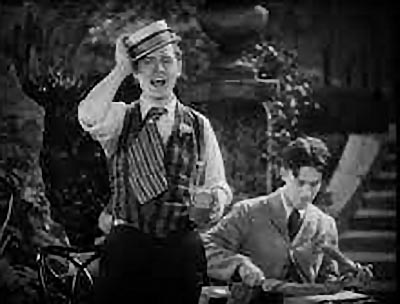
Red McKenzie and Josh Billings
© Sandy Brown Jazz 2021
You might also like these pages:
Click HERE to join our mailing list